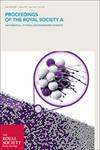带有宽带自参数吸振器的结构动力学:实验
Proceedings of the Royal Society of London. Series A. Mathematical and Physical Sciences
Pub Date : 2004-07-08
DOI:10.1098/rspa.2003.1205
引用次数: 8
摘要
实验研究了带主动控制器的共振激励薄悬臂梁的动力学特性。该控制器模拟了理论论文中讨论的无源宽带吸收器。铅-锆-钛酸盐贴片连接到光束的两侧来驱动它,而电磁激振器则驱动光束接近共振。提出了一种由一组耦合控制器组成的主动控制器,使控制器的控制方程与谐振系统二次耦合。就控制器的运动而言,控制信号是二次非线性的。结果表明,该物理系统的慢时标方程与无源宽带吸振器的慢时标方程形式相同。该控制器采用建模软件和控制器硬件板实现。进行了两组实验:一组是恒定激励频率,另一组是缓慢扫描速率下线性变化的激励频率(非平稳激励)。实验结果验证了对无源宽带自参数吸振器的分析。实验还证明了该吸收器在减小结构响应幅值方面的有效性,以及对频率失谐的鲁棒性。本文章由计算机程序翻译,如有差异,请以英文原文为准。
Dynamics of structures with wideband autoparametric vibration absorbers: experiment
The dynamics of a resonantly excited thin cantilever with an active controller are investigated experimentally. The controller mimics a passive wideband absorber discussed in the accompanying theory paper. Lead-zirconate-titanate patches are bonded to both sides of the beam to actuate it, while an electromagnetic shaker drives the beam near resonance. An active controller consisting of an array of coupled controllers is developed, such that the governing equations for the controller are quadratically coupled to the resonating system. The control signal, in terms of the motion of the controllers, is quadratically nonlinear. It is shown that the slow time-scale equations of this physical system are identical in form to those for the passive wideband vibration absorber. The controller is implemented using modelling software and a controller hardware board. Two sets of experiments are performed: one with a constant excitation frequency and the other with a linearly varying excitation frequency at a slow sweep rate (non-stationary excitation). The experimental results verify the analysis presented for the passive wideband autoparametric vibration absorber. The experiments also demonstrate the effectiveness of the absorber in reducing the response amplitude of structures, and its robustness to frequency mistuning.
求助全文
通过发布文献求助,成功后即可免费获取论文全文。
去求助
来源期刊
自引率
0.00%
发文量
0
期刊介绍:
Proceedings A publishes articles across the chemical, computational, Earth, engineering, mathematical, and physical sciences. The articles published are high-quality, original, fundamental articles of interest to a wide range of scientists, and often have long citation half-lives. As well as established disciplines, we encourage emerging and interdisciplinary areas.

 求助内容:
求助内容: 应助结果提醒方式:
应助结果提醒方式:


